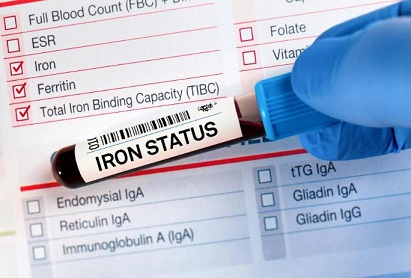Charles Tee Fact checked by:Thailand Medical News Team Sep 05, 2024 1 year, 3 months, 2 weeks, 2 hours, 39 minutes ago
Medical News: A recent study conducted by researchers from several institutions, including QIMR Berghofer Medical Research Institute in Brisbane and the University of Newcastle in Australia, explored the impact of iron-deficient and iron-rich diets on SARS-CoV-2 lung infections. The findings offer new insights into how dietary iron levels might influence viral replication and inflammation in the lungs. This
Medical News report will delve into the key outcomes of this research and how iron deficiency or overload can modulate the body’s immune response during COVID-19 infections. The study discusses how diet affects viral infections, especially in the context of SARS-CoV-2.
 The effects of dietary Iron on COVID-19 infection and recovery
The effects of dietary Iron on COVID-19 infection and recovery
Iron is an essential mineral in numerous cellular functions, especially those related to the immune system. Both iron deficiency and overload have been associated with increased susceptibility to infections and inflammation. With COVID-19 continuing to affect populations globally, understanding how diet and nutrient intake influence the severity of this disease is crucial.
The Study Setup
Researchers used C57BL/6J mice, divided into three groups based on their diets: iron-deficient, iron-loaded, and a control group that received a standard diet. These mice were then infected with a strain of the Omicron variant of SARS-CoV-2 (XBB). Following the infection, the team assessed viral replication and lung inflammation using various methods, including histology, immunohistochemistry, and RNA sequencing (RNA-Seq).
Effects on Weight and Viral Load
The study found that mice on the iron-deficient diet experienced slower growth rates compared to those in the control group. However, when it came to viral load, the iron-deficient group did not show any significant changes in viral replication in the lungs compared to controls. Interestingly, mice on the iron-loaded diet had slightly reduced viral loads, suggesting that excessive iron may have some protective effect against the virus, though the difference was modest.
These results suggest that while diet may not drastically alter viral replication in the lungs, it can affect the immune response and inflammation, which are key to determining disease severity.
Inflammation and Immune Response
Iron plays a critical role in regulating immune function, and disruptions in iron levels can lead to changes in the body's inflammatory responses. The researchers found that both iron deficiency and overload induced significant changes in the expression of inflammatory genes.
For the iron-deficient mice, the changes were associated with mild inflammation, with certain cytokines, proteins responsible for regulating immune responses, showing dysregulation. While some of these changes were detrimental, others might have a protective effect against severe disease. In particular, the iron-loaded mice exhibited a more pronounced modulation of inflammation signatures, with some markers of inflammation being reduced compared to th
e control group. This suggests that an iron-rich diet may slightly dampen the body's inflammatory response to SARS-CoV-2.
Transcriptional Changes and Pathways
RNA-Seq analysis provided a deeper look into how iron levels influenced gene expression during infection. In iron-deficient mice, only 109 differentially expressed genes (DEGs) were found at two days post-infection (2 dpi), with no specific set of genes being significantly altered. However, at six days post-infection (6 dpi), a more substantial change was observed, with 515 DEGs identified. These changes mainly involved cytokine regulation, a key component of the immune response.
In contrast, the iron-loaded group showed fewer transcriptional changes. At 2 dpi, only one DEG was identified, which did not allow for significant pathway analysis. However, at 6 dpi, 497 DEGs were observed, suggesting a more active immune response in iron-loaded mice at this later stage of infection.
One of the most notable findings was the modulation of Th1/Th2 cytokine ratios, which are critical to immune balance. In both iron-deficient and iron-loaded mice, the study found a shift towards a Th1-dominant response. Th1 responses are typically associated with antiviral activity, which might explain the reduced viral loads in the iron-loaded group. However, excessive Th1 responses can also lead to heightened inflammation, contributing to lung damage in severe COVID-19 cases.
The Role of Iron in Immune Function
Iron is essential for many immune processes, and the body has mechanisms in place to regulate its availability during infections. When an infection occurs, the body often reduces the amount of iron available to pathogens, a process known as "nutritional immunity." However, this reduction can also impact immune cells that rely on iron for their functions.
The study suggests that both iron deficiency and overload can disrupt this delicate balance. In iron-deficient mice, the reduced availability of iron may impair certain immune responses, while in iron-loaded mice, excess iron might promote harmful oxidative stress and inflammation. Despite these concerns, the study found no evidence of severe lung damage or worsened disease outcomes in either group, suggesting that the body can tolerate moderate variations in iron levels during SARS-CoV-2 infection.
Conclusions
The findings of this study indicate that while dietary iron levels can modulate the immune response to SARS-CoV-2, they do not have a drastic impact on viral replication or lung pathology. Both iron deficiency and overload caused mild changes in inflammation and immune gene expression, but these changes did not lead to significant differences in disease severity.
This research highlights the importance of maintaining a balanced diet, especially in the context of a viral infection. Iron is a critical component of many immune processes, but both too little and too much can have adverse effects on the body’s ability to fight off infections like COVID-19.
The study findings were published in the peer-reviewed journal: Frontiers in Microbiology.
https://www.frontiersin.org/journals/microbiology/articles/10.3389/fmicb.2024.1441495/full
For the latest COVID-19 News, keep on logging to Thailand
Medical News.
Read Also:
https://www.thailandmedical.news/news/new-insights-into-zinc-s-role-in-fighting-covid-19
https://www.thailandmedical.news/news/supplements-for-covid-19-in-vitro-study-shows-that-copper-gluconate-supplementation-could-inhibit-sars-cov-2-infection
